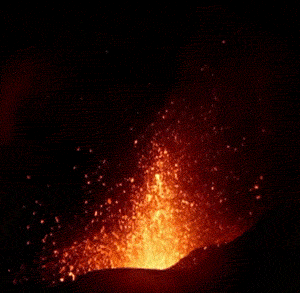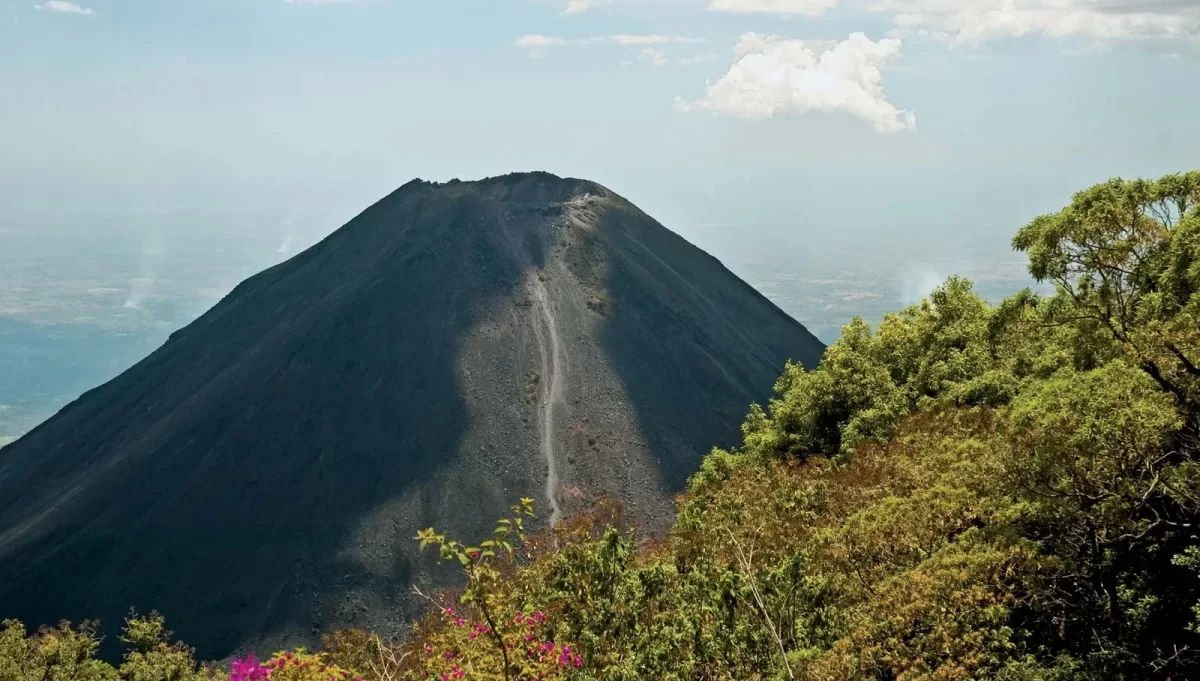

Welcome to the VMSG Newsletter, Issue no. 54! This issue comes amid the blue skies and brown fields of late August, and we hope that you’ve had a chance to breathe and relax over the last few months of summer. While many of us have taken some much-needed time away, this issue is no less full than others. We bring news of the next VMSG annual meeting (in-person for the first time since 2020!), announcements of award and bursary winners, round-ups of relevant jobs and conferences, and a report from a previous VMSG bursary award-winner. We also invite you to contribute ideas for celebrating our upcoming 60th anniversary as a special interest group within the Geological Society. As ever, happy reading. – Ailsa Naismith

It’s time to announce the next VMSG annual meeting! VMSG2023 will take place in Bloomsbury, London, on 4th – 6th January 2023, with a day of post-conference outreach activities at the Natural History Museum, in collaboration with the NHM Science Communication Team, on 7th January. VMSG2023 will be in hybrid format: delegates are most welcome to attend both in-person in London and through virtual means. The meeting is organized by local organizing committee Volcanologists of London (VoL), an informal group made up of people from the Natural History Museum, Birkbeck, University of London, UCL, Kings College London and Imperial College London.
The VMSG2023 meeting has a dedicated website: https://vmsg-2023.org. This site gives information on the scientific programme, registration and abstracts, local organizing committee, outreach activity, and meeting venue and logistics. Abstract submission opens on Monday 19th September and closes on Monday 31st October. Expressions of interest for the outreach activity close on Friday 30th September at 5:00 pm. More information on registration dates can be found on the website. – Volcanologists of London
We are thrilled to announce the 2022 winners of the Thermo-Fisher and Willy Aspinall Awards. Professor Eliza Calder has been awarded the Thermo-Fisher Award for her rich and wide-ranging contributions to many areas of volcanology over her career, and Dr. Matthew Head has been awarded the Willy Aspinall Award for his outstanding paper on crustal viscocity and volcanic deformation. Read more from our award-winners below. Huge congratulations to you both!
The VMSG Committee voted for Professor Eliza Calder (University of Edinburgh) as the 2022 winner of the Thermo-Fisher VMSG Award, given annually to an individual “who is deemed to have made a significant contribution to our current understanding of volcanic and magmatic processes”. The committee wished to recognize Eliza’s diverse research outputs, significant community contributions, and the societal impact of her work; recognizing also that Eliza’s work speaks to the wide range of interests of the VMSG community and the sectors to which they contribute.
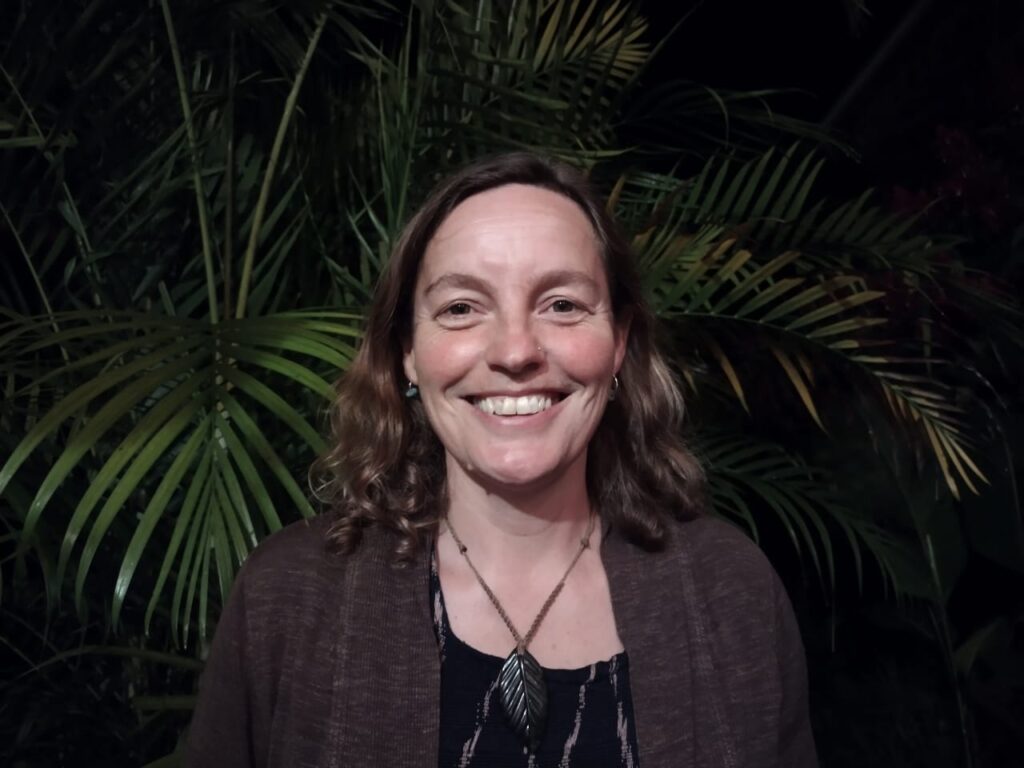
Eliza responds: “I am delighted to receive this award. I feel extremely privileged to have been able to work in amazing parts of the world, with inspiring colleagues and students on real-world problems in volcanology. Working with colleagues in volcano observatories, with issues related to volcanic hazard and risk, and with communities living around volcanoes is what has brought meaning to my work. The interdisciplinary work which I have become increasingly engaged in is both challenging and enlivening. It’s a test of intellectual openness and creativity, where we often have to work outside our comfort zone but I believe there are real gains to be made when and where we do this well. It’s a credit to the UK volcanology community that our value system is considerate of the diverse facets of a volcanology career.” The award will be bestowed to Eliza at the next annual VMSG meeting hosted in London in January 2023.
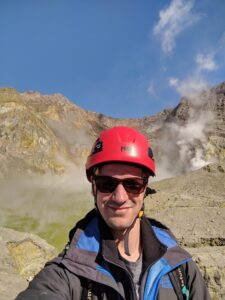
Massive congratulations to Dr. Matthew Head (University of Illinois), who was chosen as the 2022 winner of the Willy Aspinall Award. This award is made annually to the lead author of an outstanding paper on applied volcanology or geoheritage published in English, who is within three years of their being awarded a PhD at a university in the UK. Matthew led authorship of “Exploring the Impact of Thermally Controlled Crustal Viscosity on Volcanic Ground Deformation”, using a series of thermo-viscoelastic Finite Element models to explore how variations in thermal constraints influence surface displacement patterns when using the Maxwell and Standard Linear Solid (SLS) viscoelastic configurations. Matthew’s article was published in the JGR Solid Earth journal. You can read Matthew’s award-winning work here!
Matthew says of his win: “I’m really pleased to be given the Willy Aspinall award in recognition of this paper, which formed part of my PhD. We show that different thermal conditions (magma temperature and background geothermal gradient) affect the rate and amplitude of ground displacements during magmatic unrest.” As part of his award, Matthew will be giving a keynote presentation at VMSG2023 in London next January.
 IAVCEI recently opened their call for nominations to the 2023 George Walker Award and the Wager Medal, both to be bestowed at the IAVCEI Scientific Assembly in early 2023 in Rotorua, New Zealand. More information on the awards can be found here, and submission guidelines are available on the relevant IAVCEI Awards webpages (George Walker Award and Wager Medal). Applications are open until Saturday 8th October 2022.
IAVCEI recently opened their call for nominations to the 2023 George Walker Award and the Wager Medal, both to be bestowed at the IAVCEI Scientific Assembly in early 2023 in Rotorua, New Zealand. More information on the awards can be found here, and submission guidelines are available on the relevant IAVCEI Awards webpages (George Walker Award and Wager Medal). Applications are open until Saturday 8th October 2022.
We earnestly encourage you to nominate your colleagues! We would love to see and support a strong set of nominations from the VMSG community and to strengthen diversity of IAVCEI award nominees. Submission to these awards is our chance to act.
The George Walker Award honors the memory of Professor George Walker (1926-2005), who pioneered a modern quantitative approach to physical volcanology and greatly accelerated the understanding of volcanic processes. The award recognizes the achievements of a recent outstanding graduate in the research disciplines within IAVCEI, or honours a recent graduate whose achievements in volcanology involved operating under difficult circumstances. Eligible nominees should be within 7 years of PhD acquisition (extended if maternity/paternity leave has been taken since awarding of the PhD).
The Wager Medal honors the memory of Professor Lawrence Rickard Wager (1904-1965) of the University of Oxford, best known for the discovery of the Skaergaard layered intrusion and the first detailed structural, mineralogical, and petrological study of such intrusions. The Wager medal is given to a scientist up to 15 years after PhD acquisition (extended for maternity/paternity leave undertaken after award) who has made outstanding contributions to volcanology, particularly in the eight-year period prior to receiving the Medal.
The VMSG Committee are accepting applications for two positions: Awards Officer and Student Representative. More information about each position appears below. Please don’t hesitate to get in touch with any of the current committee members to ask any questions about their roles and experiences on the committee: https://vmsg.org.uk/about/committee/ .
The VMSG Committee are accepting applications for an Awards & Bursaries Officer. The appointment will be for 3 years and will start in October 2022. The role includes overseeing the range of awards and bursaries that the committee administers (details can be found on our website: awards and bursaries). We are currently completing an equality, diversity and inclusion audit of all our awards and bursaries, and the new Awards & Bursaries Officer will play an important role feeding into this process and lead implementing the outcomes.
If you are interested in applying, please submit a brief description about yourself, why you would like to take on this role and what you would bring to it (up to one A4 page) to the VMSG Secretary. Please also include a profile picture with your application. Applicants should have a PhD in the broad fields of volcanology and/or magmatic processes. In the case of multiple candidates for each post, the VMSG community members will vote online anonymously to elect candidates to the committee. They will be provided with the collated list of applicant statements and profile pictures.
Please forward this invitation to anyone you believe might be interested in this opportunity and encourage them to apply! The VMSG aims to provide a supportive environment where all in the community feel welcome and valued, and are keen to promote balance in terms of gender, ethnicity, religion, geographical location, physical ability, sexual orientation and socioeconomic background. An important part of helping to achieve this aim to ensure that the VMSG committee fully reflects the diversity of our members.
Please send your application to the VMSG Secretary (Janine.Kavanagh@liverpool.ac.uk) with ‘VMSG Committee Awards & Bursaries Application’ in the email header. The deadline for applications is Friday 9th September. We look forward to receiving your applications! – Janine Kavanagh
We are now accepting applications for a new Student Rep to join the VMSG Committee. The appointment will start in October 2022 and last for 2 years, but in the first year you will shadow the outgoing Student Rep. Applicants for this position should be currently studying for a Masters degree, PhD or equivalent in the broad fields of volcanology and magmatic processes.
If you are interested in applying, please submit a brief description about yourself, why you would like to take on this role, and what you would bring to it (approximately half an A4 page) to the VMSG Secretary. Please also include a profile picture with your application.
The VMSG aims to provide a supportive environment where all in the community are welcome and valued, and are keen to promote balance in terms of gender, ethnicity, religion, geographical location, physical ability, sexual orientation and socioeconomic background. An important part of helping to achieve this aim is to ensure that the VMSG committee fully reflects the diversity of our members. In the case of multiple candidates applying for the post, the VMSG community members will vote online and anonymously elect the applicant to the committee. They will be provided with a collated list of application texts and profile pictures.
Please send your application to the VMSG Secretary (Janine.Kavanagh@liverpool.ac.uk) with ‘Student Rep Application’ in the email header. The deadline for applications is Friday 16th September. Please don’t hesitate to get in touch to ask any questions about the role. – Janine Kavanagh
The VMSG Committee had a large and outstanding number of applications for the last round of Student Bursaries. We are thrilled to announce that we were able to provide bursaries to all applicants. Four successful awardees (Emma Horn (University of Southampton), Amy Myers (University College Dublin), Nicola Taylor (University of East Anglia), and Kate Williams (University of Liverpool)) will use the funds to attend the IAVCEI2023 Scientific Assembly in Rotorua, New Zealand; Annabelle Foster (University of Durham) plans to do fieldwork in Gran Canaria; and Ugur Balci (Scottish Universities Environmental Research Centre) will be supported to attend the Goldschmidt 2023 conference in Lyon, France. Congratulations to you all! – VMSG Committee

The VMSG is approaching their 60th anniversary as a Special Interest Group within the Geological Society. The society was first formed as the Volcanic Studies Group (VSG) in February 1964, and we are planning a lot of celebrations in 2024. We would love to hear from you about your wildest and most colourful suggestions of how we should celebrate! So please get in touch via Twitter (@vmsg_uk) or to any of the committee members via email.
Dr. Jazmin Scarlett (University of East Anglia) has perused the Royal Society Archives to trace the formation of the VMSG. Minutes from previous meetings in 1964 appear in bold, and underneath Jazmin shares photos and transcripts that describe the formation of the new research group and its fledgling communications with the Volcanological Expeditions Committee (later the Volcanological Research Committee).
CMB/130/2 – Meeting of the Volcanological Expeditions Committee, 7th February 1964

Item 2: Geological Society Volcanic Studies Group
“It was reported that the Geological Society was considering establishing a Volcanic Studies Group and it was agreed that should such a group be set up, it would be advantageous if the Chairman were to be invited to meetings of the Vulcanological Expeditions Committee.”
Item 8: Volcanic Studies Group
“It was reported that a volcanic studies group had been formed in London ‘to bring together those actively engaged in the scientific study of volcanoes and their products, irrespective of the ages of the volcanoes or their localities, in order to promote full and rapid exchange of observations and conclusions, particularly concerning present-day subaerial and submarine volcanoes, and to encourage visits to sites of volcanic activity and to research centres mainly devoted to such studies.’ Dr A.T.J. Dollar, Birkbeck College, was Acting Secretary.”
CMB/130/3 – Meeting of the Volcanological Research Committee, 26th May 1965
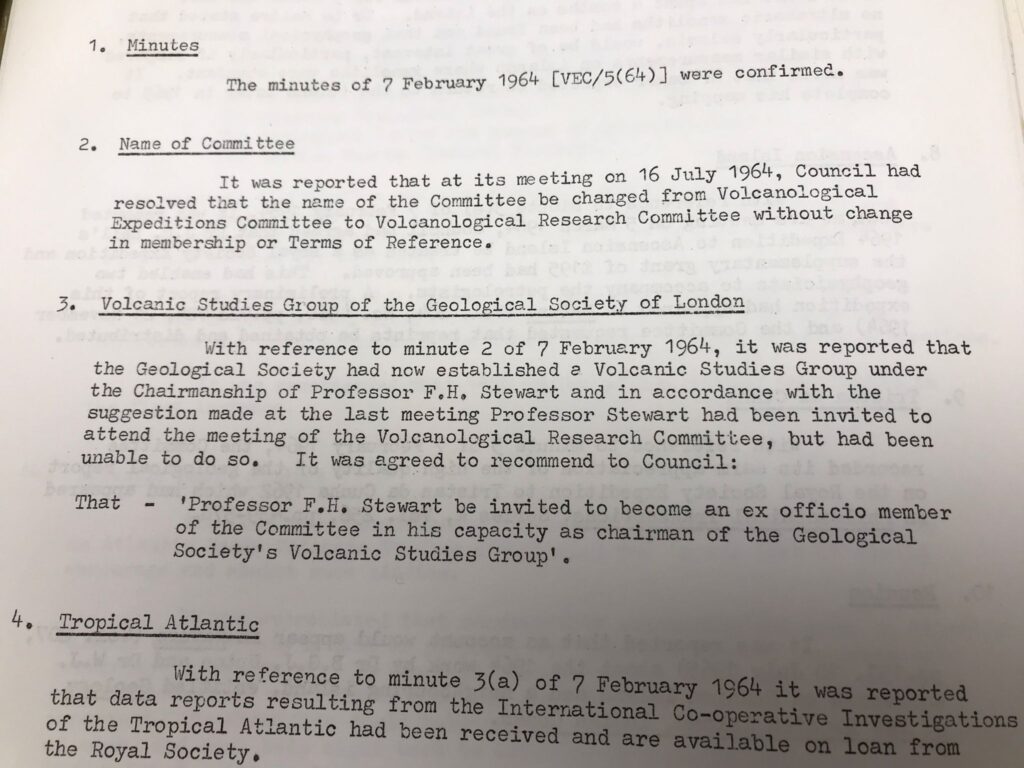
Item 2: Name of Committee
“It was reported that at its meeting on 16 July 1964, Council had resolved that the name of the Committee be changed from Volcanological Expeditions Committee to Volcanological Research Committee without change in membership or Terms of Reference.”
Item 3: Volcanic Studies Group of the Geological Society of London
“With reference to minute 2 of 7 February 1964, it was reported that the Geological Society had now established a Volcanic Studies Group under the Chairmanship of Professor F.H. Stewart and in accordance with the suggestion made at the last meeting Professor Stewart had been invited to attend the meeting of the Volcanological Research Committee, but had been unable to do so. It was agreed to recommend to Council:
That – ‘Professor F.H. Stewart be invited to become an ex officio member of the Committee in his capacity as chairman of the Geological Society’s Volcanic Studies Group’.”

This is your last chance to submit abstracts for the forthcoming IAVCEI Scientific Assembly! The meeting will be hosted in stunning Rotorua, New Zealand, on 30th Jan – 3rd Feb 2023. More information can be found on the official conference website at www.iavcei2023.org, which includes key information for early career researchers (ECRs). Abstract submission (here) and submissions to the ECR plenary sessions (here) both close on Friday 2nd September. We look forward to welcoming many of you early next year to beautiful New Zealand. – IAVCEI2023 Local Organizing Committee
IAVCEI is glad to announce the opening of the call for grants to participate in the IAVCEI Scientific Assembly in Rotorua, New Zealand. IAVCEI is inclusive to all of its members and aims to support members who would otherwise not be able to attend the conference. Consideration for these grants prioritizes members who do not have access to their own conference funding, including, but not exclusive to, students and professional scientists from financially restricted countries. Because the number of grants is limited, the request needs to be accompanied by a motivation letter (why you need the grant). The requests must be sent to Roberto Sulpizio (IAVCEI Secretary General: Roberto.sulpizio@uniba.it) before Thursday 15th September 2022.
The grants are dedicated to IAVCEI members that have submitted at least one abstract as presenters (both physical or virtual). A typical grant will cover registration for the meeting. A small number of travel grants will be available for applicants from far countries. – IAVCEI Secretariat

The 28th assembly of the International Union of Geodesy and Geophysics (IUGG) will be hosted in Berlin on 11th – 20th July 2023. IAVCEI will be one of the nine scientific programme committees (SPCs) in attendance. More information will appear closer to the date on the official conference website: https://www.iugg2023berlin.org/.
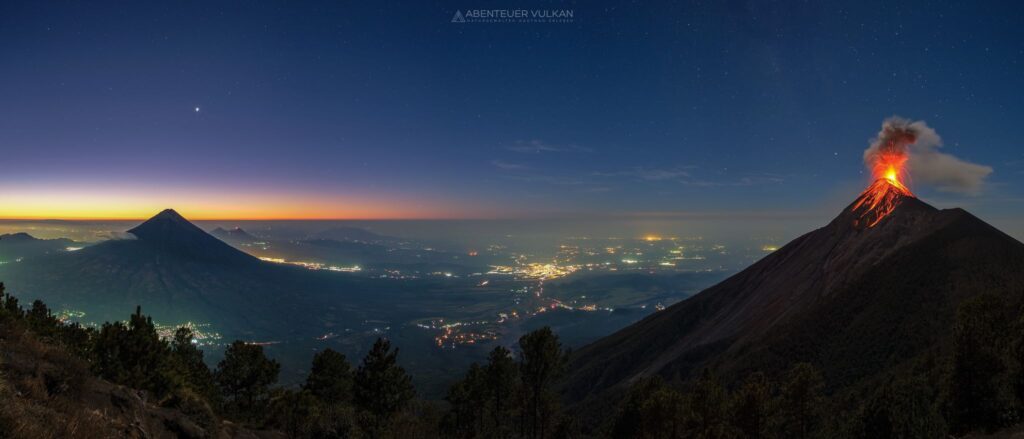
It was announced at the Cities on Volcanoes 11 conference (held in Heraklion, Crete, in June 2022) that the next installment of Cities on Volcanoes will be held in Antigua Guatemala, Guatemala, on 11th – 17th February 2024. This will be the first CoV conference held in Central America and also the first bilingual CoV conference (in English and Spanish). An early public-facing webpage is available here. A second commercial website and the first conference circular are expected in early 2023. Inquiries may be directed to cov12antigua@gmail.com. The Local Organizing Committee write:

“Guatemala is a volcanic nation. The strong relationship that exists between the activity of its volcanoes and the communities settled around them has been recorded and represented through paintings and drawings dating back to the 17th century.
Antigua Guatemala, a colonial city founded in 1543, will be the ideal place to host the 12th edition of Cities on Volcanoes (COV12) in February 2024. Its history, and that of the rest of southern Guatemala, is totally connected to volcanoes. Today, Antigua Guatemala is not the capital of Guatemala, but it is a vibrant, touristic and beautiful city. It is located between Fuego and Agua volcanoes and is a short distance from the capital city (Guatemala City) and Pacaya volcano. Antigua is spectacularly preserved as a colonial city and deserves its designation as a UNESCO World Heritage Site. Its cobblestone streets and its strong culture (shaped by volcanic and seismic activity since its inception) are perfect for exploring. All amenities, including the conference venue, a variety of hotels, restaurants and the central park, will be easily accessible by foot. We are planning COV12 to be a full week of activities, including daytime and evening events, as well as mid-conference field trips.
Our mission for this conference is the fusion of diverse communities, which can generate exchange of information and promote activities related to risk mitigation and resilience. We believe that it is the perfect opportunity for Central American countries to participate in and contribute to one of the most important events of the volcanology social science community, which for the first time will be in a bilingual format. We are delighted that COV12 is accessible to diverse participants from the region and beyond.
On behalf of the local organizing committee, we invite you to participate in COV12 in Antigua Guatemala in February 2024.” – Carla M. Chun Q. y Amilcar E. Roca P.
The University of Birmingham is currently advertising for a PDRA to join the new NERC-NSF Large Grant “C-FORCE”, which will measure how the global carbon cycle responded from start to finish during a past period of global warming that was driven by volcanic emissions of carbon-based greenhouse gases to the atmosphere. The opportunity would suit someone with research experience that can be related to observing and/or modelling volcanic processes and associated greenhouse gas emissions.
The full job advert is here. The deadline for applications is Sunday 4th September. If you have any questions about the post, please contact Steve Jones (s.jones.4@bham.ac.uk).
The British Geological Survey is seeking a permanent appointment for a minerals commodity analyst based at the BGS headquarters in Keyworth, Nottingham. This is a full-time appointment for a role within a small team of experts. The successful candidate will work on data compilation, intelligence gathering and analysis on global and UK minerals, and on metals markets within the new UK Critical Minerals Intelligence Centre (UK CMIC). The candidate should have a suitable post-graduate qualification and 2 – 3 years of relevant postgraduate experience.
Find the full job advert here. The applications deadline is Sunday 4th September.
The Sedgwick Museum is seeking to appoint someone with good rock and mineral identification skills and an interest in working with museum collections to join their friendly team. The role is initially a 12-month fixed-term contract; extension is possible dependent on funding. The new person will work to facilitate researcher and student access to the Museum’s petrology and mineralogy collections and contribute to migration of the museum’s petrological collections into a new purpose built store.
Further information may be found at https://www.jobs.cam.ac.uk/job/34911/. To have an informal conversation about this role, please contact the Collections Manager, Dan Pemberton dsp30@cam.ac.uk. Enquires about the application procedure should be directed to Jane Hart jane@esc.cam.ac.uk. The application deadline is Sunday 11th September.
Newcastle University is seeking to appoint a full-time technician who will provide technical support for the analysis of lake and ocean sediment cores in different palaeoenvironmental projects. The technician’s responsibilities will include sample preparation for stable isotope analysis of bulk sediments, invertebrate remains, and biomarkers, including faecal sterols, bile acids, and leaf waxes. The successful candidate will work to ensure that sample procedures are carried out safely and in accordance with quality standards and health and safety regulations.
Further information can be found here. For informal enquiries contact Maarten van Hardenbroek (maarten.vanhardenbroek@newcastle.ac.uk) or Andy Henderson (andrew.henderson@newcastle.ac.uk). The application deadline is Sunday 11th September.
We love to celebrate members of our community: this section is a regular quarterly of celebrations including PhD vivas. If you have one to contribute to a future newsletter, please get in touch with Ailsa Naismith (ailsa.naismith@bristol.ac.uk).
A huge congratulations to the Leeds Volcanologists’ newest doctor, Dr Rachel Whitty, who passed her Viva in July. Rachel presented her thesis, “Characterising downwind particulate and sulfur dioxide air pollution from volcanic emissions”; you can find out more about her research here. We wish her the most explosive future and that she has every success going forward.
Attending the EGU2022 general assembly in Vienna, 23-27 May 2022

After two years of virtual meetings, I am very grateful for my VMSG bursary, which allowed me to attend my first in-person EGU22 General Assembly in Vienna to present my PhD work on exploring the mechanical influence of mush poroelasticity on volcanic surface deformation in a special session, “Volcanic processes: Tectonics, Deformation, geodesy, unrest”.
I had the opportunity to give a 7-minute oral presentation in this session. The work I presented explores the role of magma poroelasticity in the development of volcano deformation – a new direction for the volcano geodesy field. In my presentation, I show the influence of poroelastic mechanical behaviour on reservoir pressure evolution and resultant spatio-temporal surface deformation. My study suggests that modelling the magmatic reservoir as a poroelastic crystal mush rather than a 100% melt magma reservoir can significantly modify the resulting spatial and temporal mechanical evolution of the system. In my talk, I showed that our models suggest that post-injection and post-eruption inflation could occur, which are linked to a poroelastic response associated with continuous melt diffusion. Following an injection/eruption, a steady-state point is eventually achieved when the fluid pressure reaches a uniform value throughout the reservoir.
My attendance at EGU has given this work, and the forthcoming paper, necessary exposure. This is the first time I have presented this work to a conference audience. Following my presentation, I received positive feedback on my talk and a constructive discussion with the participants.
Attending the EGU in person has allowed me to hold vital conversations with other researchers, share my research results, and gain new collaborators, all of which are indispensable to my remaining doctoral studies and future goals. Moreover, participating in the EGU in person allowed me to develop professional connections with other scientists interested in volcano deformation and volcanic unrest, who could benefit from my work.
Once again, thanks for the VMSG Travel Bursary, which alleviated a big part of the financial burden of attending EGU and made this trip possible. – Rami Alshembari (University of Exeter)
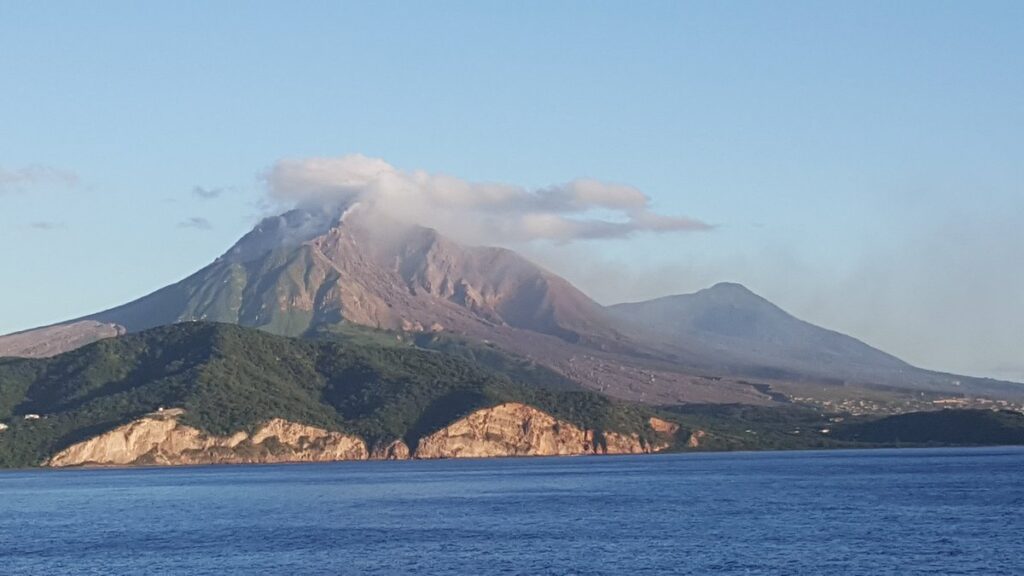
Professor Jenni Barclay will give a public lecture at the Geological Society on Monday 7th November 2022 on, “The stories we tell about volcanoes, and why it matters when they erupt”. Her talk promises to “explore the role that narratives – or the stories that we tell of the causes and consequences of volcanic disasters– play in how scientists, decision-makers and communities make sense of these uncertain situations, and even how they influence actions”. Click here for the link to tickets via Eventbrite.
Do you have any information on international volcanology internships that you would like to share with the VMSG community? Then please get in touch! We would love to share opportunities in this area with members of our community seeking field experience. We particularly welcome information on sources of funding that support said opportunities. If you have information to share, please write to Ed McGowan (egm8@leicester.ac.uk).
Don’t forget to keep in touch with us and other volcanologists around the world. There are several ways you can do this: through the VMSG PhD and ECR directory (here), the Arizona State University mailing list (here), and the VMSG mailing list (here).
